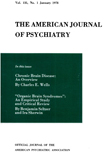A Psychiatric Study of the Life and Work of Dorothea Dix
Abstract
There have been no psychiatric studies of Dorothea Dix despite the importance to psychiatry of her reforms. This paper focuses on some psychodynamic themes in her life: parental identifications, childhood deprivation and reaction formation, religious conversion and mysticism, and depressive and hypomanic states. Her experiences are compared with those of other women reformers: St. Teresa, Florence Nightingale, and Jane Addams. The author concludes that successful careers in social service stem from positive identifications, although reaction formations are also prominent.
Access content
To read the fulltext, please use one of the options below to sign in or purchase access.- Personal login
- Institutional Login
- Sign in via OpenAthens
- Register for access
-
Please login/register if you wish to pair your device and check access availability.
Not a subscriber?
PsychiatryOnline subscription options offer access to the DSM-5 library, books, journals, CME, and patient resources. This all-in-one virtual library provides psychiatrists and mental health professionals with key resources for diagnosis, treatment, research, and professional development.
Need more help? PsychiatryOnline Customer Service may be reached by emailing [email protected] or by calling 800-368-5777 (in the U.S.) or 703-907-7322 (outside the U.S.).



